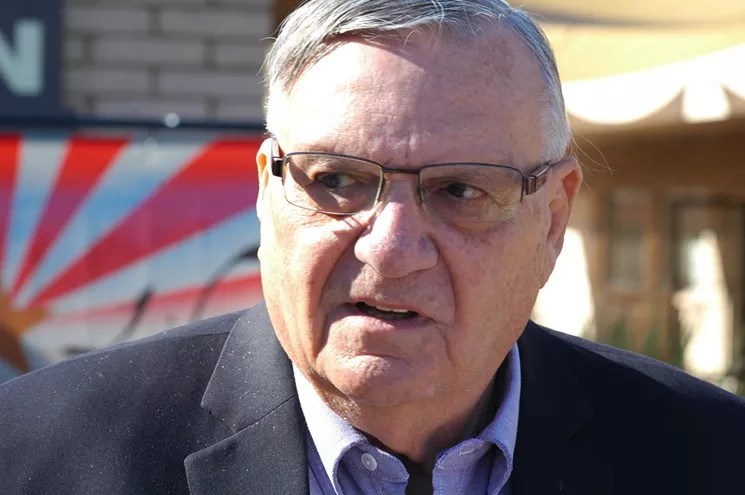
Stephen Lemons

Audio By Carbonatix
For a man fondly accustomed to decades in the limelight, former Maricopa County Sheriff Joe Arpaio’s no-show for the ongoing Joe Show was oddly surreal.
In a telephone conference called by U.S. District Court Judge Susan Bolton to decide how to proceed with sentencing, there were as many reporters as court officials, including Bolton. No lawyers. No Joe.
Indeed, much of the hearing was about whether Arpaio was present on the phone as ordered and if he wanted to waive his rights to attend. He was not present to hear Bolton rule that lawyers for him and the government have until September 29 to submit all the written materials needed before sentencing.
Arpaio faces up to six months in jail for his misdemeanor conviction on contempt of court charges.
We’re thankful for you. Are you thankful for us?
We feel thankful for our staff and for the privilege of fulfilling our mission to be an unparalleled source of information and insight in Phoenix. We’re aiming to raise $30,000 by December 31, so we can continue covering what matters most to this community.
Help us continue giving back to Phoenix.
Bolton ruled on Monday that Arpaio showed “flagrant disregard” for a 2011 order by U.S. District Court Judge Murray Snow compelling the Maricopa County Sheriff’s Office to stop detaining people based on their immigration status.
Bolton found that Arpaio willfully ignored the order, which he clearly understood, and instead oversaw and bragged about operations that netted another 171 illegal immigrants in the 17 months before Snow made his order barring racial profiling permanent.
Arpaio’s attorneys soundly and immediately rejected Bolton’s reasoning and vowed an appeal. They have not yet filed that appeal.
On Thursday, by telephone, they were in a combative mood.
First, Judge Bolton asked if the 85-year-old, six-term ex-sheriff was present. His attorney Dennis Wilenchik argued nothing compelled Arpaio to be present. Bolton repeated the question. It went on like that for a bit.
Bolton turned the discussion to whether a routine document, a pre-sentencing report, was needed. Courts rely on such reports, which document the criminal histories, mental health, and social integration of defendants to decide whether to raise or lower a recommended sentence.
The government’s attorney, John Keller, said yes. It’s standard procedure in all criminal cases.
No, Wilenchik said.
“I don’t see the need for a full-blown PSR on a petty offense,” he said, calling the report “a waste of time and money for the government,” his voice on the phone said.
“My thoughts were similar. That’s why I wanted this conference,” Judge Bolton said. She ruled that Arpaio and his attorneys would have to sign and submit a request to waive the report, and if they did, she’d agree to it.
Then, not taking “yes” for an answer, Wilenchik and co-counsel Mark Goldman argued some more with the judge over whether they felt her approach was “agreeable.” That went on for a bit, too.
Now it was the judge’s patience that was on trial.
The rest of the hearing went smoothly. Everybody agreed that no more than 10 people could write character references for or against the sheriff, and that a similar limit would cap how many would appear in court to make a statement or testify.
A list is due September 29, as well as any other written preparations, such as sentencing memos. Arpaio is due to be sentenced October 5.
But Goldman still wasn’t happy. He wanted to discuss Bolton finding Arpaio guilty in a written bench ruling, rather than telling him to his face in open court.
“That’s a matter of substance I don’t want to discuss in the absence of the defendant,” Bolton said.
Then she ended the 25-minute conference.
It wasn’t the most gripping courtroom drama, nor the most important. But it offered a glimpse, in microcosm, of how a lawman of 60 years ran afoul of the law he swore to uphold, accused of something Wilenchik said in opening arguments was a “shameful” and “ridiculous” allegation and “an assault on our logic.”
The mini-hearing didn’t just illustrate how Arpaio got to this place, but also why the legal battles against him, starting with a class-action civil rights lawsuit, dragged on for 10 years.
Instead of limelight, Arpaio now contemplates the twilight of his storied, polarizing career. He won’t turn out the lights quietly, even in an empty courtroom or in a telephone conference he didn’t attend.